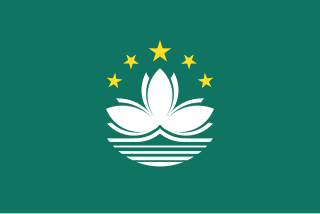
Macau, also spelled Macao and officially the Macao Special Administrative Region of the People's Republic of China (MSAR), is a city and special administrative region of the People's Republic of China in the western Pearl River Delta by the South China Sea. With a population of about 680,000 and an area of 32.9 km2 (12.7 sq mi), it is the most densely populated region in the world.
Politics of Macau is a framework of a politically constrained multi-party presidential system, dominated by the People's Republic of China. It includes the legislature, the judiciary, the government, and a multi-party system. Executive power is exercised by the government, led by the Chief Executive.

The Governor of Macau was a Portuguese colonial official who headed the colony of Macau, before 1623 called Captain-major. The post was replaced on 20 December 1999 upon the transfer of sovereignty over Macau to China by the office of the Chief Executive of Macau.

Edmund Ho Hau-wah, GOIH, GML, GCM is a Macanese politician who served as the first Chief Executive of the Macau Special Administrative Region from 1999 to 2009. He currently serves as a Vice-Chairman of the Chinese People's Political Consultative Conference.

The Chief Executive of the Macau Special Administrative Region of the People's Republic of China is the head of government of Macau, a special administrative region of China. The position replaced the office of Governor of Macau, the former head of Macau as an overseas province of Portugal. Under the Basic Law of Macau, the chief executive's role is to:
...be the head of the Macau Special Administrative Region and shall represent the Region. The Chief Executive of the Macau Special Administrative Region shall be accountable to the Central People's Government and the Macau Special Administrative Region in accordance with the provisions of this Law.
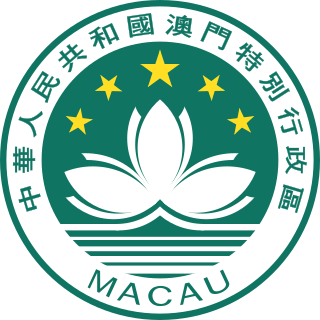
The Legislative Assembly is the organ of the legislative branch of Macau. It is a 33-member body comprising 14 directly elected members, 12 indirectly elected members representing functional constituencies and 7 members appointed by the chief executive. It is located at Sé.
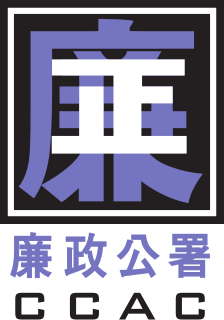
The Commission Against Corruption is an official body of Macau responsible for the prevention, investigation and (probably) prosecution of corrupt activities.
Elections for the Legislative Assembly of Macau were held in Macau on September 25, 2005.
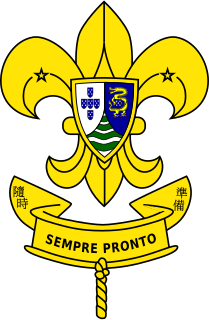
The Associação de Escoteiros de Macau is the national Scouting association in Macau, China. It is an Associate Member of the Asia-Pacific Region of the World Organization of the Scout Movement, and became a Full Member of WOSM on 16 August 2017 during the 2017 World Scout Conference.
Human rights in Macau refers to the basic rights of citizens of Macau, a former Portuguese colony that reverted to Chinese administration in 1999. As a Special Administrative Region (SAR) of the People's Republic of China (PRC), Macau enjoys a high degree of autonomy, except in defence and foreign affairs, and its citizens have basic freedoms and enjoy legally protected rights. The Macau Basic Law is the SAR's constitution, promulgated by PRC's National People's Congress (NPC) in 1993.
The government of the People's Republic of China is collectively the state authority in the People's Republic of China (PRC) under the exclusive political leadership of the Chinese Communist Party (CCP). It consists of legislative, executive, military, supervisory, judicial, and procuratorial branches.

Under the Basic Law, Macau's diplomatic relations and defence are the responsibility of the People's Republic of China. Except diplomatic relations and defence, nonetheless, Macau has retained considerable autonomy in all aspects, including economic and commercial relations, customs control.
The Government of the Macau Special Administrative Region of the People's Republic of China, are headed by secretariats or commissioners and report directly to the chief executive. The affairs of the government are decided by secretaries, who are appointed by the chief executive and endorsed by the State Council of the Central People's Government in Beijing. As a special administrative region of China, Macau has a high degree of autonomy, in light of the "One Country, Two Systems" policy. The Macau Government, financially independent from the Central People's Government, oversees the affairs of Macau.

TDM - Teledifusão de Macau, S. A., provides public broadcasting services in Macau. By running five digital terrestrial TV channels, one satellite TV channel and two radio channels, TDM provides local audiences with a wide range of content in Macau’s two official languages, Chinese and Portuguese, as well as having time-slots for English as well as Indonesian and Tagalog, which reflects the multicultural nature of the city, with 95 percent of the population being the Chinese and five percent made up of the Portuguese and other ethnic groups.

Fernando Chui Sai-on is a Macau politician who served as the 2nd Chief Executive of Macau from 2009 to 2019. He served as Secretary for Social and Cultural Affairs from 1999 to 2009.
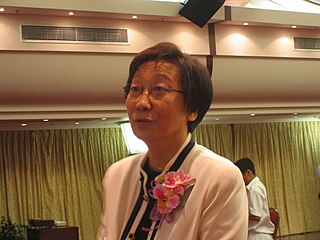
Susana Chou Vaz da Luz, also known as Chou Kei Jan and Cao Qizhen, is a Macau politician who served as the President of the Legislative Assembly of Macau from 1999 to 2009.
The 2010 Macau transfer of sovereignty anniversary protest (2010年澳門回歸示威遊行) occurred on December 20, 2010 on the 11th anniversary of the Transfer of sovereignty of Macau. The protest took place on the same date as the handover anniversary in 1999. The protesters mainly complained about universal suffrage, housing prices and how the Macau citizens are treated worse than the pandas given to them by Beijing.
Legislative elections were held in Macau on 15 September 2013 according to the provisions of the Basic Law of Macau. This election was the first of its kind succeeding the reform of the Legislative Assembly that created four new seats; two new geographical constituency seats and two new functional constituency seats. Out of a total of 33 seats, 14 were elected by universal suffrage under the highest averages method, while 12 were voted on from the Functional constituency, and 7 from nomination by the Chief Executive.

Ho Iat-seng is a Macau politician serving as the 3rd and current Chief Executive of Macau since December 2019.
Elections for the 7th Legislative Assembly of Macao were held in Macau on 12 September 2021. This legislative election will return 33 members of the Legislative Assembly of Macau, with 14 directly elected by all electorates, 12 indirectly elected by special interest groups and 7 appointed by the Chief Executive 15 days after the announcement of the election results.












